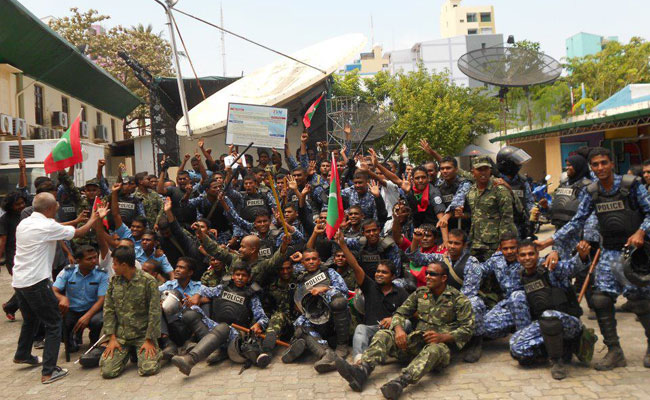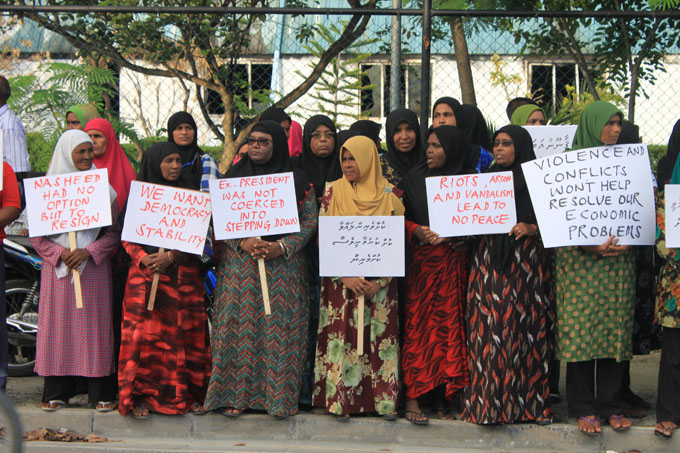Reporters Without Borders (RSF) has expressed strong concerns for media freedom in the Maldives’ following the release of strong evidence that police forces used firearm prohibited to their role to force open the station of Maldives National Broadcasting Corporation (MNBC) on February 7, 2012.
The station was overrun by security forces as violent clashes broke out across Male’, culminating in the resignation of then president Mohamed Nasheed “at gunpoint”, he has said. By early afternoon MNBC was re-branded as Television Maldives (TVM), its title under former president Maumoon Abdul Gayoom.
MNBC’s former director general Adam Shareef described the situation to RSF.
Shareef said he had noticed that the situation on Male’ had become “serious”, and around 4:00am requested the Defense Minister to send more security to the station.
MNBC headquarters and some journalists were previously attacked during the opposition-led protests which began on January 16, 2012, when Criminal Court Chief Judge Abdulla Mohamed was arrested by the military after attempting to block his own police summons. The government at the time backed their decision by citing the judge’s record of professional misconduct and blocking police operations, as well as holding suspects without evidence and releasing suspects with strong evidence against them, most notably an accused murderer who killed another person soon after his release.
Shareef said he was shocked when the Defense Minister “refused to send any security forces to MNBC. At that time I knew there as something wrong with the police and defense forces. We were in shock at the refusal, and we were waiting from the early morning until 7:30am. At 7:30 the security members had left their shift, so there was no security at MNBC.
“I was alone with my staff, and I ordered them to stay calm and cooperate with MNDF [Maldives National Defense Force],” he said.
Shareef explained that individuals aligned with the opposition came to the station in the late morning and requested that the station be signed over to their control. When he refused, Shareef was informed that Nasheed had stepped down and Dr Mohamed Waheed Hassan Manik had assumed control of the country.
“I said I hadn’t heard the news,” Shareef told RSF, pointing out that the confrontation took place before Nasheed had formally resigned at 1:00pm that day.
Shareef goes on to describe the violent take-over of the station, which left many of his staff in fear.
A video released yesterday corroborates Shareef’s account of the take-over. A police officer uses a gun to open the locked gates of the state broadcasting station, allowing dozens of police and military forces as well as civilians to rush the building where staff can be heard crying and shouting in fear.
Police in the Maldives are not issued firearms.
Noting that the Maldives ranks 73rd out of 179 countries in the 2011-2012 RSF press freedom index, “Reporters Without Borders hopes that the Commonwealth ministerial mission, which is to investigate the circumstances of last week’s change of government, will also shed light on the takeover of MNBC, the use of threats and violence against certain journalists and media, and the threats to which several journalists continue to be exposed.”
Members of Nasheed’s Maldivian Democratic Party (MDP) have today signed a petition requesting parliament to acknowledge last Tuesday’s events as a coup; to bring those involved to justice; and to hold elections as soon as possible.
Since the station takeover TVM has filled its airtime with Disney movies and cooking shows, streaming pre-recorded programs even during the police force’s violent crackdown on a peaceful MDP march on February 8.
In a February 13 statement, RSF warned that Maldives media is in a precarious position amidst the political turbulence.
“The international community must take full account of the danger to the media and to freedom of information in the Maldives,” reads the statement. “For the moment, media coverage of the incidents taking place in this Indian Ocean archipelago is limiting the violence against journalists.”
Foreign media groups including Al Jazeera, BBC, Reuters, AFP, India Express, the New York Times and Japan’s leading paper The Yomiuri Shimbun converged on Male’ on February 8, bringing the murky politics of the perceived island paradise into global focus.
“But, once the international community’s attention moves on, we fear that media personnel, especially those who are branded as ‘pro-Nasheed,’ could be exposed to reprisals by supporters of the new government or by the security forces, which may not be fully under the new government’s control,” RSF cautions.
It didn’t take long for Maldivians to wonder if they may be subject to similar rules of social behavior.
Following the crackdown in Male’, local media Raajje TV inaccurately reported that two MDP supporters had been killed. Islanders in six southern atolls responded with a firey attack on police stations, court houses and prosecutor general’s offices, leaving public facilities and legal records in ashes.
The next day, Male’-based media received reports opposition party supporters were leading police and military forces to the homes of MDP supporters, who were consequently beaten and arrested without charges.
In a previous article Minivan News investigated the claims. While the reported aggression appear to have calmed some citizens of Addu, Maldives’ southernmost atoll which reported the most severe damage, expressed concern that the quiet was temporary.
“We are not safe because we don’t know when again it will start,” said one man speaking to Minivan News outside Feydhoo’s smoldering court house.
Alif Fahumy Ahmed, whose brother-in-law was still detained in Gan’s burnt police station on February 11, was similarly watchful. “Things in Addu have calmed at the moment, but they may continue once HRCM and the reporters leave,” he said.

